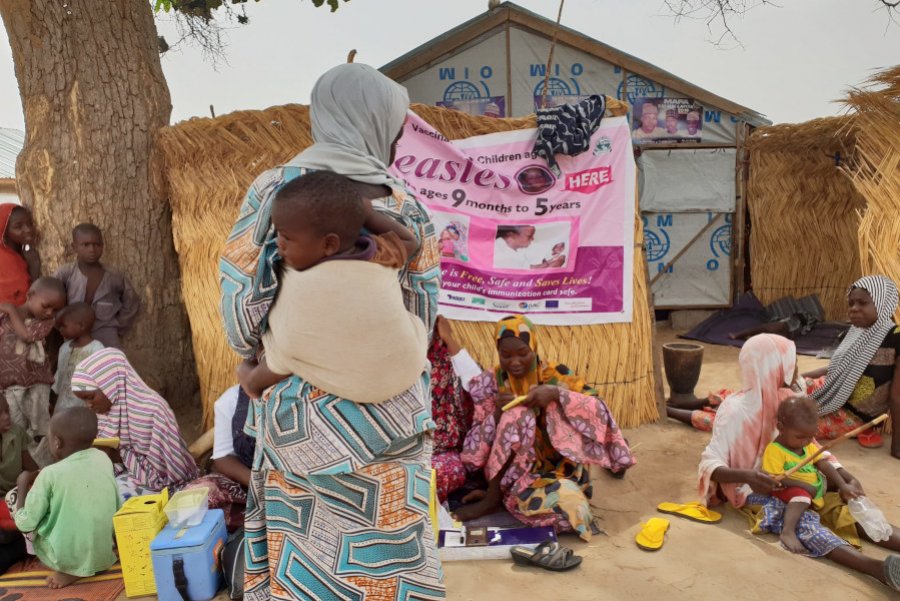
Twelve out of the 15 West African countries (80%) that constitute the Economic Community of West African States (ECOWAS) are off-track to achieving measles elimination, according to new research published this week in The Lancet Global Health. This is due to an inability in reaching key measles control and elimination milestones which were set by the World Health Organization to be achieved by these countries as of the end of 2020.
This analysis conducted by Dr Oghenebrume Wariri and colleagues at the MRC Unit The Gambia at LSHTM is the first comprehensive analysis on the progress towards the WHO measles control and elimination milestones between 2001 and 2019, that have exclusively focused on the 15 ECOWAS countries.
The work was led by researchers from the Vaccines and Immunity Theme at the MRC Unit the Gambia at LSHTM, and the Vaccine Centre at London School of Hygiene & Tropical Medicine (LSHTM). Experts from Chatham House London, the Nigerian Centre for Disease Control (NCDC), EPI Programmes in Sierra Leone, Guinea, and Benin Republic, and the WHO Country Offices in Liberia, Burkina Faso and Nigeria also co-authored this research.
In this multicountry analysis of national immunisation coverage and case surveillance data from 1st January 2001 to 31st December 2019, the researchers developed a country-level measles scorecard that used eight key indicators to track progress towards measles elimination as of the end of 2019. Based on the scorecard, Cape Verde, The Gambia, and Ghana have made substantial progress towards achieving measles elimination. However, Benin, Burkina Faso, Cote d’ Ivoire, Guinea, Guinea Bissau, Liberia, Mali, Niger, Nigeria, Senegal, Sierra Leone, and Togo are still off-track to achieve this target, which was set for the end of 2020.
Dr Wariri, a Clinical Research Fellow at the MRC Unit The Gambia at LSHTM and first author of the paper said, ‘’Although some progress has been made by many West African countries towards measles elimination since 2001, more work needs to be done by the countries already falling behind the 2020 target. Our findings could inform regional strategies and shared learning for countries to reflect on the evidence presented here and ensure that every child everywhere in West Africa is protected against measles’’.
Overall, the ECOWAS region had a measles incidence rate in 2019 that remains 33 times higher than the 2020 elimination target which is set at ≤1 measle case per million population. An estimated 4 588 040 children in the ECOWAS region did not receive MCV1 in 2019; the majority (71%) disproportionately lived in Nigeria which accounted for 52% of the estimated regional total population.
Dr Ngozi Erondu, Associate Fellow, Chatham House and co-author on the paper hopes that this work encourages practitioners and policy makers to create resilient health systems that can absorb shocks such as a once-in-a century pandemic, while still aggressively implementing immunisation activities for measles and other vaccine preventable diseases. She said “As the world focuses on COVID-19, this paper emphasis how measles control and elimination must continue to be prioritised but also how all disease outbreaks share similar challenges that must be addressed. While, overall, we find that West African regional measles progress is weak, our paper examines within-region variation and highlights the need for targeted interventions to improve measles vaccinations—each country has a set of factors that could have either contributed or impeded progress towards measles elimination.”
Dr Terna Nomhwange, a member of the Vaccine Preventable Disease (VPD) team at the WHO Country Office in Nigeria and co-senior author believes there is still a lot of work to be done to achieve global and regional elimination targets. He says “Some of the gains made in the measles control efforts are stagnating or being reversed across the region. As countries in the sub region reflect on the evidence put forward in this paper, there is a need to consider challenges from the last decade and further ensure efforts align with the Measles & Rubella strategic framework 2021-2030; within the broader Immunization Agenda of 2030. The efforts of countries within the sub region to introduce the second dose of measles containing vaccines in the second year of life is a huge opportunity to protect previously missed infants as well as high quality SIAs.”
Prof Beate Kampmann, Theme Leader of the Vaccines & Immunity research at the MRC Unit The Gambia at LSHTM, Director of the Vaccine Centre at LSHTM and senior author on the paper said, “This data clearly show that measles remains a serious threat in the West African region and we have recently witnessed also in Europe how rapidly this potentially deadly infection can spread. It is entirely preventable with a safe and effective vaccine, but it needs two doses to optimise protection. We need to keep pushing for complete immunisation -especially relevant in times of COVID-19, where it is easy to take our eyes off the ball for protection against measles and other serious childhood infections”.
Our postgraduate taught courses provide health practitioners, clinicians, policy-makers, scientists and recent graduates with a world-class qualification in public and global health.
If you are coming to LSHTM to study a distance learning programme (PG Cert, PG Dip, MSc or individual modules) starting in 2024, you may be eligible for a 5% discount on your tuition fees.
These fee reduction schemes are available for a limited time only.
